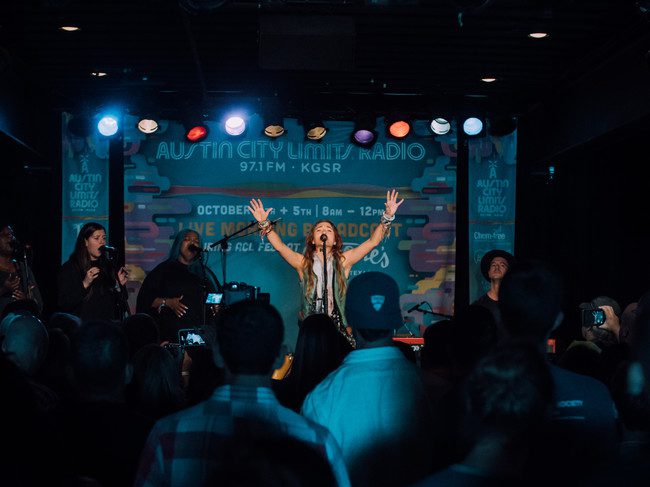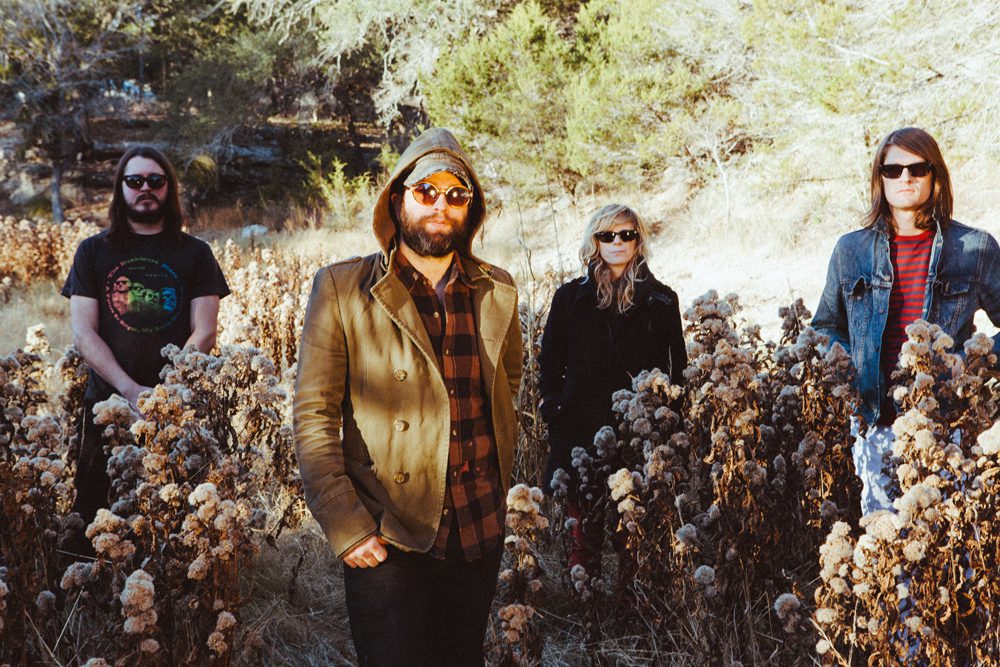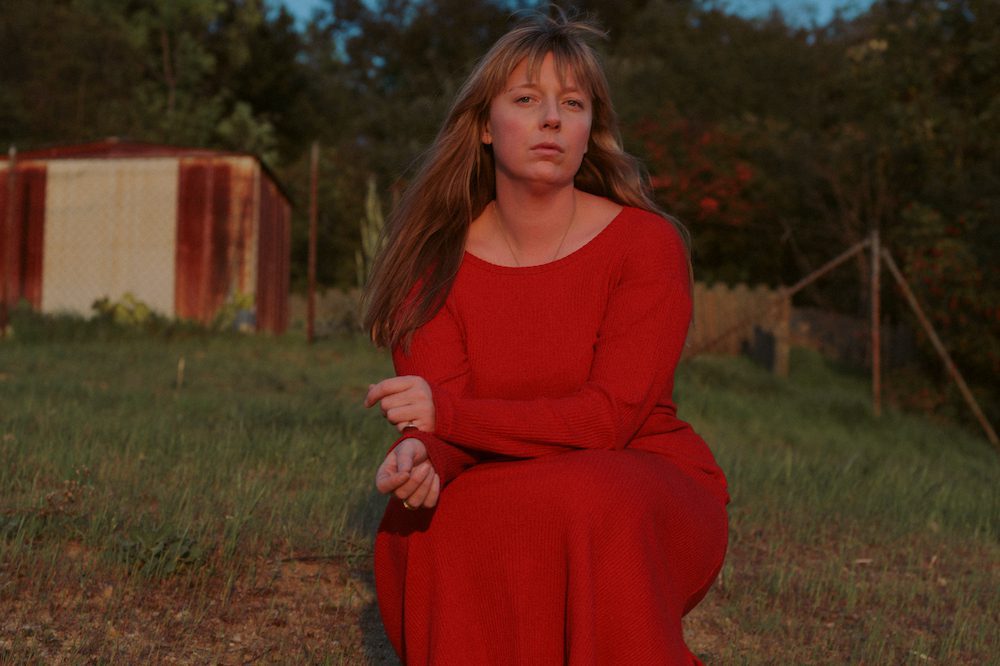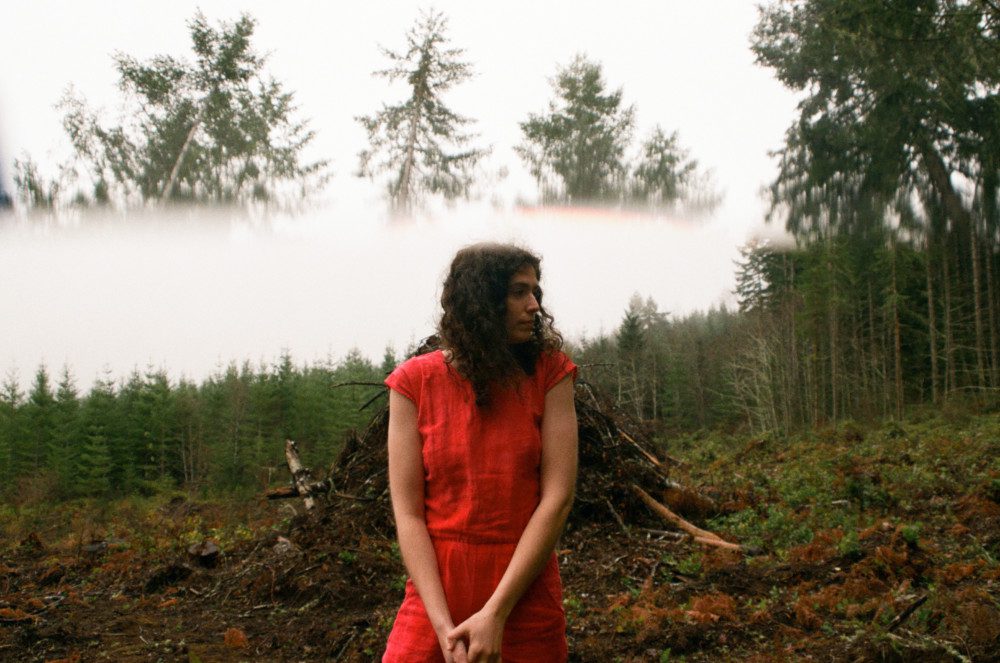

Tucked away on Orchard Street among eclectic restaurants (and the karaoke spot where I’ve put on a few shows of my own) sits the modest entrance to Rockwood Music Hall’s Stage 3. It’s a basement lounge filled with candlelit two-person tables and a trapezoidal stage that looks made for no more than one person. Seated on the red velvet couch lining Stage 3’s back wall, I could see and hear Evelyn Frances loud and clear.
She opens the show by creating a jarring live loop rooted in hums and breaths, establishing her presence on the small stage. Going into “Nina,” the intense imagery punches through the subtlety of her plucking. “Rain can’t wash out a woman made of fire,” she sings. Her voice, despite the softening of consonants and airiness with which it carries, is so striking that she’s never drowned out by the band.
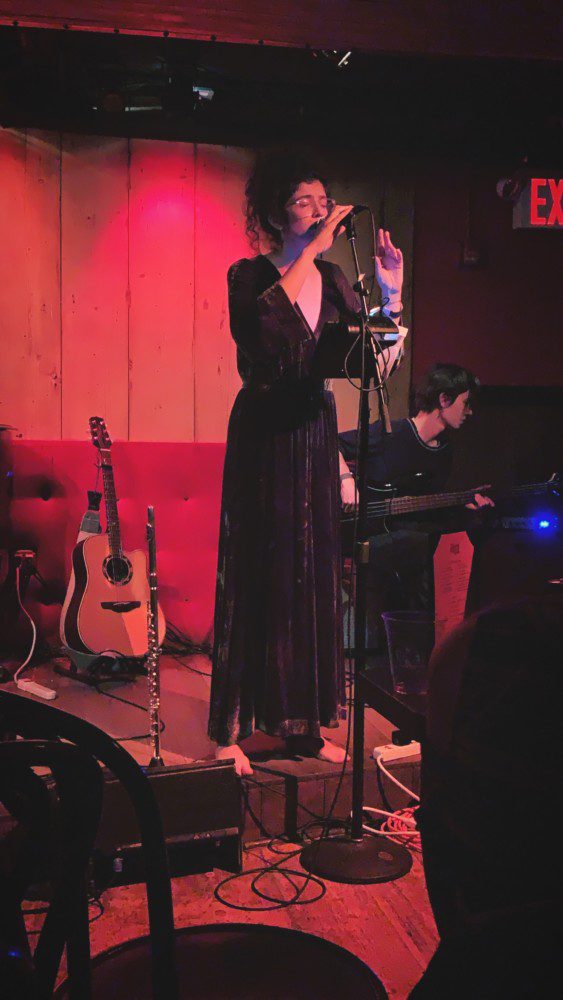
The set-up is simple, with Tristan Allen on bass and Ricky Petraglia on the drums seated next to her. On tracks that were just her and her guitar, it was almost as if the band watched in admiration and awe along with the crowd. She also surprises me with a haunting cover of Radiohead’s “Videotape,” adding a jazzy twist to its purposefully dissonant rhythm. Listening to her on record, I’d have best categorized her as folk, though watching her in her element is a different experience. Her methodology is experimental, her velveteen dress ethereal, and her lack of shoes show a disregard for being labeled as anything but her natural self.
We go to chat in the bar upstairs after she makes her rounds greeting and hugging each table after the show. She tells me the room was filled with friends she invited out, and tells me about the family that cultivated her musicianship from a young age.
“My mom is a singer, my dad is a trumpet player, my sister plays bass, and we grew up with piano lessons,” she told me. “I’m very grateful my parents let us have music lessons all throughout my life. I started playing flute when I was ten, guitar when I was twelve, and then I started writing songs when I was fourteen and it all happened naturally.”
From there, she was on a trajectory that sent her to study at Berklee in Boston, to then interning at two staples in the New York music scene, Mom + Pop Music and Electric Lady Studios. At Electric Lady, she met Grammy Award-winning producer Phil Joly, who was head engineer there at the time. Boldly, she asked if he’d be willing to work on her upcoming record Seed. “No way he’s gonna say yes,” she thought.
“He was like, ‘Let’s do it.’ I couldn’t have done it without him,” she said. “We just work so well together. I’ve never found someone, an engineer or producer, who knows what I’m talking about when I say, ‘Let’s make it feel sandy, like you’re walking in a forest. He’s incredible.”
“Sandy” is one of many seemingly odd words that perfectly encapsulates the sound of her music. Her single “Treehouse Palace” embodies the package of visceral lyricism, production, and salient vocals with the power to transport anyone into a meditative state.
“I have this very childhood dream of having an actual treehouse to write songs in, and to me that’s a palace,” she describes when I ask about the juxtaposition of the natural and the regal. “It’s more so in the feelings. I really write from this weird place of a visceral feeling. I always use the word ‘visceral’ with my producer Phil, or like ‘gritty’ and ‘grainy’ – those are words we use a lot to describe the songs.”
We’re interrupted during our interview by a friend of hers, who asks about one song in particular. “Your song ‘In the Morning…’ I thought it was the cheekiest of all your songs. I don’t know if it was supposed to emulate anything else, but it reminded me a lot of Aretha Franklin’s ‘I Say A Little Prayer.’”
“Ooh, thank you!”
“And then you scat, which is very much of the same time of when she did that song,” her friend continued. “It was very much along the same vein of some of the songs I love, but it’s totally new.”
“Thanks,” said Frances. “It’s about an asshole. A guy who would just get up and leave.”
“Yeah, ‘Do you think about me on the train in the morning?’” I interjected, trying to recall a line.
“I can’t think of my lyrics when I’m not singing them,” she laughed. “‘‘Do you think of me on your walk to the train in the morning?’”
“You wake up and the tea is cold,” her friend added.
“He never enjoyed the tea that I made him, so he would let it sit there while we didn’t talk.”
The subtleties of human interaction depicted in songs like “In The Morning” parallel the idea of being attuned to the fragility of nature, and the record explores a wide range of human emotions in a way that’s cyclical and organic. “Basically a lot of the songs are about the ways that humans destroy, whether that’s each other or themselves or nature,” she explained.
Evelyn Frances’ latest single “Treehouse Palace” is now streaming. Her album Seed, nearly two years in the making, will be released on April 26.

